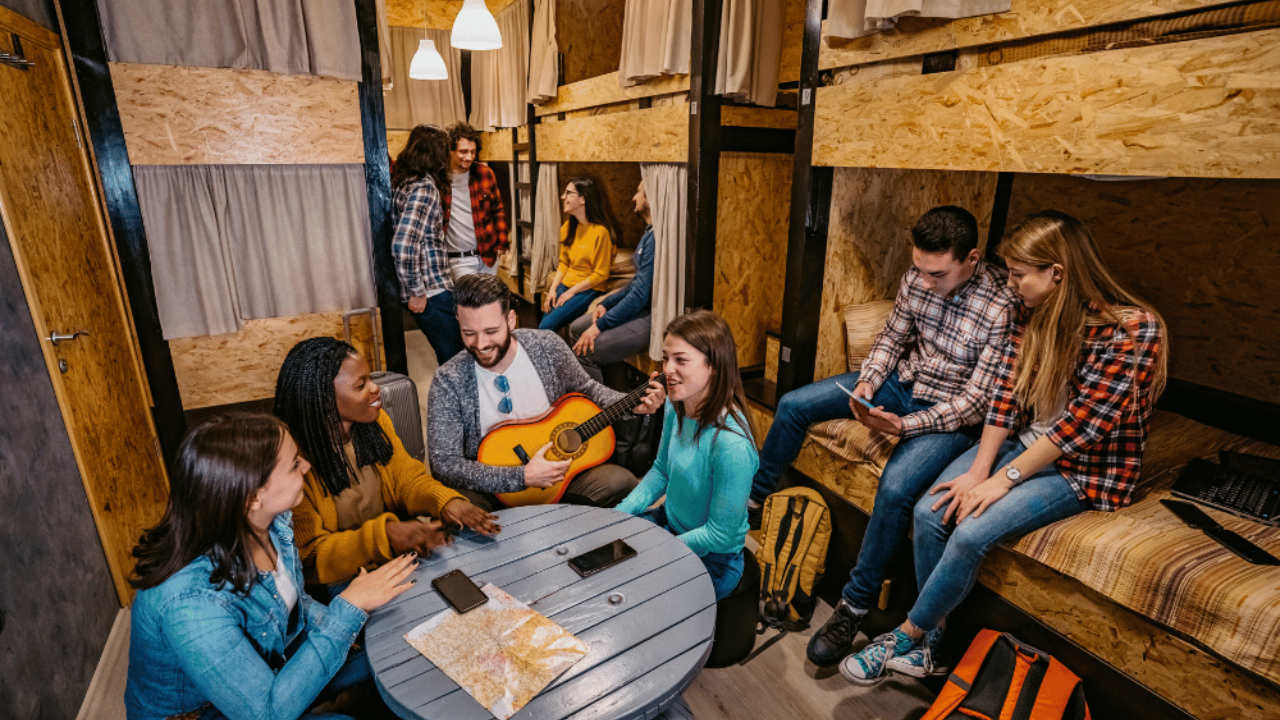CORE PRODUCT
What Exactly Is a Hostel? A Hotelier’s Guide
March 28, 2024 Justine. S
Share this post

Are you curious about what a hostel is and how it differs from other types of hotels? Perhaps you’re wondering if your property fits the bill of a true hostel or if there are certain best practices you should be following.
Well, you’ve come to the right place! In this blog post, we’ll be exploring the ins and outs of hostels, what makes them unique, and how you can ensure that your property is aligned with the hostel experience.
Whether you’re a seasoned hostel owner or just starting out, this post will provide you with valuable insights and tips to help you create an unforgettable hostel experience for your guests. So, let’s dive in!
What Exactly is a Hostel?
Hostels are budget-friendly accommodations that provide travelers with a place to sleep and store their belongings while they explore a new city or destination, typically in shared dormitory-style rooms.
They offer cheap beds and are more communal and social than other accommodation options.
One of the main attractions of staying in a hostel is the social aspect. Most commonly, aimed at budget-conscious travelers, including backpackers, solo travelers, and students eager to see the world, who may be seeking a sense of community and companionship while on the road.
Shared common areas may include bathrooms, kitchens, dining areas, and social areas, while shared common rooms may have amenities like televisions and free Wi-Fi.
How Do Hostels Work?
Hostels operate on a unique model that emphasizes shared facilities and communal living. Hostels can come in many different forms, including traditional bunk-bed dorm rooms, private rooms, or even treehouses and igloos.
Guests can choose between booking beds in shared dormitories or private rooms, all of which come with communal facilities like kitchens, lounges, and bathrooms.
Hostels often have a unique character and charm that can offer a more authentic and immersive travel experience. Self-catering facilities are generally available, with travelers having the option to cook their own meals instead of ordering them as you would in a hotel.
What Are Typical Common Hostel Amenities?
Hostels may not have as many amenities as hotels, but they offer a more affordable experience for travelers on a budget. Despite the limited amenities, guests can still expect to have everything they need for a comfortable stay.
Here are some of the amenities that you can typically expect to find in most hostels:
- Personal locker for storing your belongings (although you may need to bring your own lock)
- Shared common areas, bathrooms, and showers
- Free Wi-Fi
- Access to washing machines (some may require payment)
- Locally sourced meals (breakfast and/or dinner)
- Organized social events such as pub crawls, day trips, or social nights
In short, hostels may not have the same level of luxury as hotels, but they make up for it with their unique social atmosphere and practical amenities.
Hostel Room Types
Hostels provide different types of rooms to suit people’s preferences and budgets. These rooms may be shared or private, and they can have either mixed or single-sex occupants.
Here are some of the most popular types of rooms available in hostels:
Dorms: These are shared rooms with bunk beds that can accommodate anywhere from four to forty people. The four-bed dorm is the most common type. Prices are typically lower for dorms, but they may not be suitable for those who prefer more privacy.
Private Rooms: These are individual rooms that can come with a single twin bed, two twin beds, or a double/king-size bed. They are more expensive than dorms but offer more privacy.
Female-Only Dorms: These are dorms that are exclusively for women. They provide a more comfortable and safe setting for female travelers.
Dorms Without Bunk Beds: Some classier hostels offer dorms with isolated beds instead of bunk beds. This provides more space and privacy between occupants.
Pod-Styled Dorms: These dorms are becoming more popular around the world. They offer a bit more privacy and come with personal power sockets and a curtain to close at night.
Family Rooms: Some hostels provide family-style private rooms that can accommodate multiple family members in one room.
Apartment Style: These are studio-apartment-style rooms that are similar to Airbnbs. They come with a private kitchen, bathroom, and sleeping area.
Suite-Style: These are top-of-the-line hostel rooms that provide a larger space with various amenities and sometimes feature two levels.
While not all hostels offer luxury-style accommodations, most provide a range of options that include dorms and private rooms.
Hostel vs Hotel: What is The Difference?
When it comes to accommodation, hostels and hotels have their own set of differences. For starters, hotels offer private rooms and bathrooms for guests, while hostels prioritize socialization and shared spaces.
Plus, hostels tend to be more budget-friendly and provide a lively atmosphere for meeting fellow travelers. On the other hand, hotels offer more amenities and privacy but at a higher cost.
It’s worth noting that some hostels have curfews to ensure a peaceful environment for guests and age restrictions in certain cases. Owning a hostel can be advantageous in terms of lower overhead costs and a unique guest experience, but it may also require a different marketing and management approach.
Are There Different Types of Hostels
Yes, when it comes to hostels, there are many types to choose from. Some hostels cater to backpackers on a budget, while others offer more luxurious accommodations for those who are willing to spend a little extra. Here are a few of the most common types of hostels you’ll come across:
Boutique Hostels
Boutique hostels are a relatively new type of accommodation that combines the affordability of a typical hostel with the style and comfort of a boutique hotel.
These hostels often have a unique design and offer a range of amenities, such as private rooms, gourmet kitchens, and social spaces. They tend to attract a younger and more sophisticated crowd and are a great option if you’re looking to provide a more upscale hostel experience.
Traditional Hostels
The most commonly found type of hostel is the traditional one. These hostels offer a simple lodging experience, with shared bathrooms and dormitory-style rooms, but at a budget-friendly cost. Typically, backpackers and travelers who are mindful of their expenses opt for these hostels.
Party Hostels
These hostels are designed to cater to travelers who want to let loose and have fun. They often have a bar on-site, organize social events, and attract a younger crowd. Keep in mind that if you’re looking for a quiet night’s sleep, a party hostel might not be the best choice.
Eco-Friendly Hostels
Eco hostels are designed to have a minimal impact on the environment by using eco-friendly materials and sustainable practices. Some eco-hostels may have an on-site garden, use renewable energy sources, or even offer educational programs focused on sustainability. It’s important to note that while eco-hostels may be more expensive compared to traditional hostels, they provide a unique and fulfilling experience.
Activity-driven hostels
Activity hostels are all about providing an authentic and immersive experience for guests who are passionate about activities such as yoga or surfing.
These hostels specialize in catering to the needs of guests who want to engage in a specific activity, and they provide services and amenities that cater to that activity. For instance, a surf hostel may be located right on the beach and offer surfboard rentals to guests
How to Determine Your Property Type
The first step in determining the type of your property is to consider your target audience. Who are you trying to attract – backpackers, students, families, or business travelers?
Backpackers might be more interested in a budget-friendly hostel with shared dormitory rooms, while families may prefer private rooms with ensuite bathrooms, and business travelers want convenience and comfort.
Once you have identified your target audience, you can decide if your property aligns more with a hotel or hostel and then market your property effectively based on the type of accommodation you offer.
If you’re looking for advice on how to market your hostel effectively, you can check out our blog: 11 Effective Hostel Marketing Tips to Attract More Guests. We have some great tips that might be helpful to you.
Pro Tip: Remember, whether you’re managing a large hostel or a small boutique property, having a cloud-based hostel management system can streamline your daily operations.
How RoomRaccoon Can Help Hostel Owners Manage Their Business
RoomRaccoon is an all-in-one hotel management system designed to streamline operations and manage rental properties. Why struggle when you can have software that does it all for you?
Here are a few ways that RoomRaccoon can make managing your property easier:
1. Cloud-Based PMS
Did you know that investing in a property management system (PMS) like RoomRaccoon can offer your hostel many benefits beyond just managing room availability, rates, guest profiles, and reservations?
With RoomRaccoon’s PMS, you can easily generate detailed reports on your hostel operations and track your revenue, occupancy, and other key performance indicators. This can help you make data-driven decisions and optimize your hostel’s performance.
Apart from that, our PMS offers a range of features that can help streamline your hostel’s operations, such as automated guest communication, online check-in and check-out, and payment processing.
And with the ability to monitor your reservations on the go, using just your smartphone or tablet, you’ll have the freedom to manage your hostel from anywhere, at any time.
2. Booking Engine
RoomRaccoon’s booking engine is an invaluable tool if you want to maximize your revenue.
Our booking engine is designed to make direct online bookings easier and more profitable. Instead of accepting direct bookings only via email, phone, or walk-in, you can take direct bookings from your own website without any commission fees.
Whether you’re handling phone bookings, group reservations, or online bookings, RoomRaccoon makes it easy and efficient. With our integration with top online travel agencies, you’ll also enjoy more brand exposure and seamless management.
3. Channel Manager
Are you tired of managing multiple booking channels manually? Do you sometimes forget to update your availability on one platform, resulting in double bookings and unhappy guests? RoomRaccoon’s channel manager is here to solve all your problems.
Our two-way connection to major booking channels like Hostelworld, Booking.com, and Tripadvisor allows you to expand your reach and attract travelers from all over the world.
With real-time availability and synchronization, you’ll never miss a booking or suffer from double bookings again. Plus, our API integration connects you to over 100 channels, making it easier than ever to manage your listings, reservations, and revenue.
Final Thoughts
As we wrap up this guide, it’s worth noting that hostels have come a long way since their early days as bare-bones accommodations for budget-minded travelers. Today, hostels offer a range of options to suit different budgets, preferences, and needs.
From private rooms to treehouses pod-style dorms to luxury suites, hostels have something for everyone. While they may not offer the same level of luxury as hotels, hostels make up for it with their unique social atmosphere, practical amenities, and immersive travel experiences.
So, whether you’re a seasoned traveler or a curious hotelier, we hope this guide has given you a fresh perspective on what hostels have to offer.
If you’re interested in learning more about how to manage your hostel efficiently and provide an exceptional guest experience, don’t hesitate to book a free demo of our property management software today!
Follow us
Justine. S
Justine is a Content Manager at RoomRaccoon, bringing her background in language and communication studies to the SaaS world. When she's not writing about the latest trends in the industry, she's probably out exploring the world or indulging her love of pink.
Related Posts
Subscribe to our newsletter for more on the latest hospitality & RoomRaccoon updates delivered straight to your inbox!













